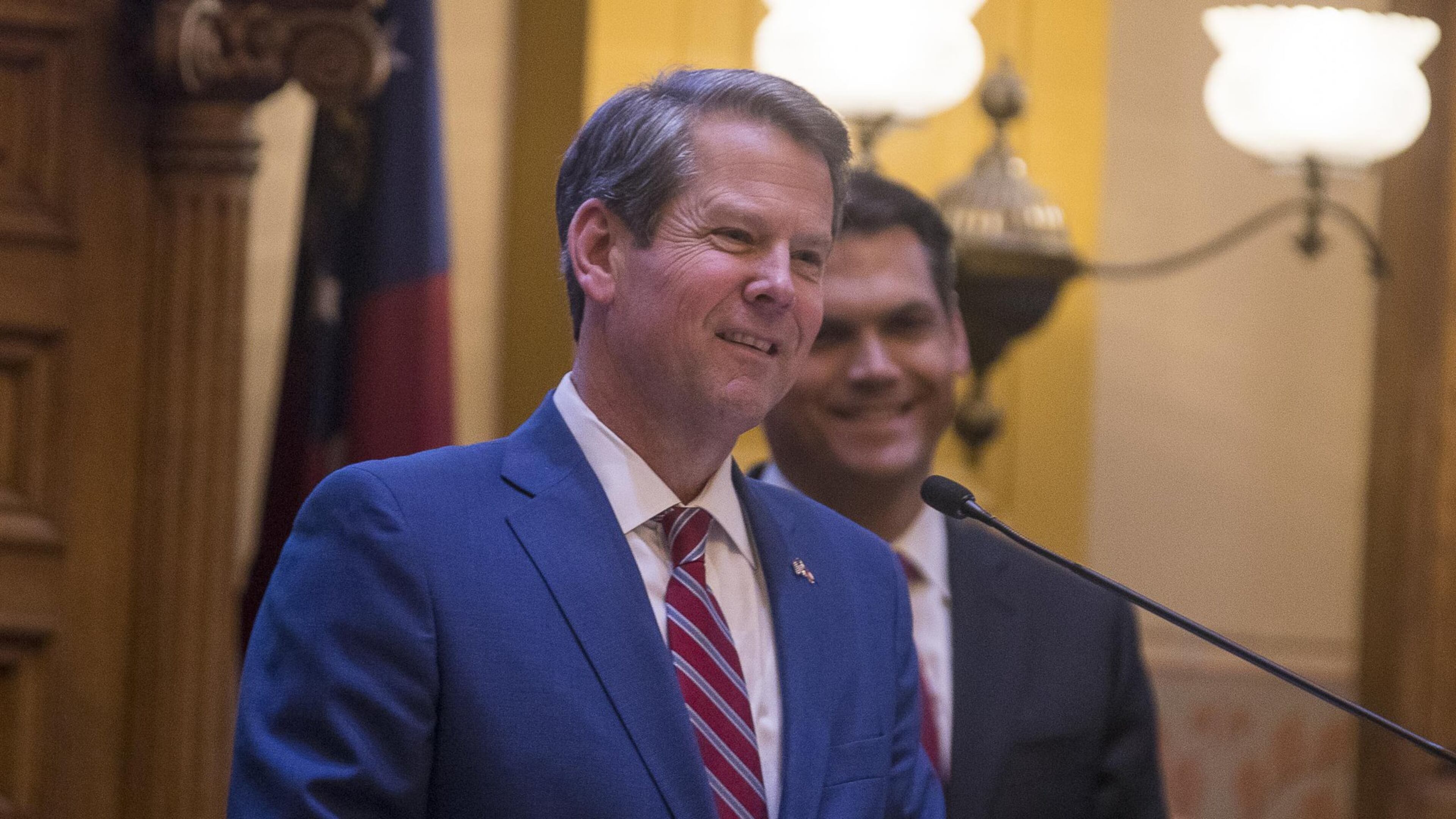Georgia ‘heartbeat’ bill hasn’t roiled recruiting like religious liberty

As Georgia prepared for its biggest corporate recruiting event three years ago, then-Gov. Nathan Deal bucked his party and vetoed a “religious liberty” bill that had drawn calls for boycotts.
Companies had threatened to pull jobs out of neighboring states that enacted bills seen as discriminatory to lesbian, gay, bisexual and transgender people. And Georgia leaders used their time to assure corporate honchos at the annual Red Carpet Tour that Georgia was a welcoming state.
On Thursday, as the Red Carpet Tour stopped at the Masters, Gov. Brian Kemp’s expected signing of a controversial anti-abortion bill hovered in the background. But unlike three years ago, corporate threats to pull business out of Georgia haven’t materialized.
Some celebrities, Democrats and abortion-rights advocates have warned of economic aftershocks if Kemp signs House Bill 481, which would ban most abortions as early as six weeks. But no major Georgia-based firm or big-name Hollywood studio has opposed the anti-abortion bill.

Fortune 500 companies that have fought "religious liberty" legislation for years have sidestepped the abortion controversy, including each of the major Georgia-based firms that played a prominent role in the 2016 debate. State and metro area pro-business groups either declined or didn't respond to requests to comment.
Some business leaders have privately said the certainty of a court challenge has eased some concerns from high-powered corporate executives. The Georgia chapter of the American Civil Liberties Union and other critics have prepared litigation to be filed as soon as Kemp signs the law, and similar measures in other states have been blocked by judges.
One reason why HB 481 hasn’t triggered a business backlash: The debate around abortion rights is a deeply divisive — and deeply personal — matter.
Seven in 10 Georgia voters oppose overturning the landmark U.S. Supreme Court case that guaranteed the right to abortion, an Atlanta Journal-Constitution poll found. Yet, Georgians were almost evenly split on the pending abortion law.
Georgia Democrats predict the blowback will grow when Kemp signs the measure into law, which he has promised to do. They also are keen to remind business leaders that Kemp also supports a version of the “religious liberty” measure and failed to push through a jet fuel tax break that would benefit Delta Air Lines, the state’s largest private employer.
State Sen. Nikema Williams, who chairs the state Democratic Party, accused Kemp of delaying the bill signing until after the Masters Tournament ends.
“Brian Kemp can’t spend three months rolling back our freedoms, only to rub elbows with business leaders the next week — there are consequences to his actions,” she said.

Some veteran recruiters expect the abortion bill and other contentious social debates to give businesses pause.
Brian McGowan, who once ran Invest Atlanta and the Atlanta Beltline, said Georgia earns high marks for its business climate and Atlanta’s airport. But the uncertainty about other conservative measures could factor into decisions that usually are dominated by analyses of incentives, workforce and infrastructure.
“If this isn’t the thing that makes a company change their investment decision, what’s to come?” asked McGowan, who now runs an economic development organization in Seattle.
The measure’s supporters say threats about economic fallout are overblown, and nod to other states that passed similar laws without any significant business turmoil.
In an interview, Kemp suggested some companies may be drawn more to Georgia because of his conservative stance on social issues, though he didn’t give an example of any potential recruits that could be swayed by that case.
He said conservatives who are energized by his support for the new restrictions — a pledge he first made a year ago on the campaign trail — are not “going to be running out of our state because we’re protecting the unborn.”
“Our business environment’s good,” Kemp said. “We cannot change our values of who we are for money. And we’re not going to do that. That’s what makes our state great.
“For people to want to boycott the state because we are protecting life at the heartbeat — I don’t understand that.”
High Stakes
The debate is unfolding at a high-pressure moment. The Red Carpet Tour has been pivotal for state business leaders for more than a half-century, leading to thousands of jobs and billions in investment. The four-day annual schmooze fest helped land Kia Motors and other wins for jobs.
Like past events, this year’s tour features a dinner with the governor, two days at Augusta National Golf Club and a jaunt to the Georgia coast. But unlike most years, the 2019 tour includes mostly site selection professionals, not executives of targeted companies.

In some ways, having consultants rather than CEOs makes the stakes even higher.
The attendees represent blue-chip corporate clients with active expansion projects, and Georgia officials hope to vault to the top of their lists. Between watching golf, Georgia leaders will answer questions about available land, business climate, incentives and the state’s workforce.
One senior official who attended Wednesday’s opening dinner said the heartbeat bill didn’t come up in conversation. The official, who wasn’t authorized to comment publicly, said that wasn’t surprising given the crowd of number-crunchers more concerned about tax rates than social issues.
The tour is more about building relationships that lay the groundwork for big jobs deals rather than bare-knuckled negotiations.
Deal’s administration prepared for the event for weeks, setting up elaborate tours around the state that often started with a gala at the Governor’s Mansion. A-list Georgia business leaders would attend as “ambassadors” for the state, longtime Deal aide Chris Riley said.
Riley recalled how one year, storms and tornado warnings forced a wave of flight cancellations just as big-time executives were set to arrive. Plans were hastily reshuffled.
A state dinner was replaced by an informal meeting at the guests’ Buckhead hotel. Riley said the governor sealed a deal that year that brought 800 automotive jobs to his native Hall County.
“It’s one of the most important things we do every year with economic development,” he said of the tour, expressing confidence that the Kemps will be “great ambassadors” this year.
Prominent Democrats say reviving culturally conservative legislation is the wrong way to roll out the welcome mat. Fair Fight Action, the group launched by Stacey Abrams, launched a digital ad Friday targeting Augusta voters contends the governor's stance "hurts women." Her allies echoed that message.
"This bill doesn't do anything to support the business community," said state Rep. Erica Thomas, an Austell Democrat. "And when I think about the economic implications, I think about the people in my district that work as makeup artists, caterers, who could be affected by a battle between Kemp and the entertainment industry."




